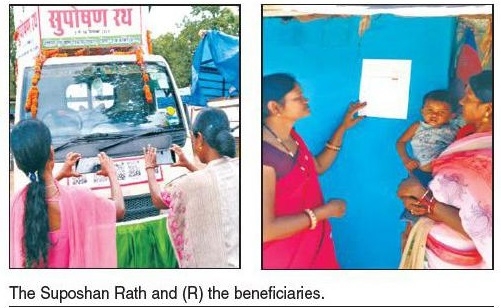Suposhan Abhiyan ‘Kanker Kilkari’ yields significant results in Kanker
Date :23-Nov-2020

The Hitavada State Bureau :
Raipur/Kanker,
The programme has helped 5,673 children out of 14,433 to come out of malnutrition
7,308 women, out of 8,149, have come out of severe anaemia
Uttar Bastar Kanker is an extreme LWE affected district with majority of population being tribals. As per the National Family Health Survey (NFHS)-4, 49.5% of the children were underweight, 35.5% were stunted and 15.5% were wasted and almost 67.5% of women were found anaemic in the district. The dietary habits of the people in the area consist of rice, lentils and vegetables majorly and there is a significant lack of food diversity. Agriculture and waged labour are the main sources of livelihood and the nutritional requirement is hardly met by the meals taken.
Some traditional practices and superstitions also act as hindrances towards behavioural changes in the dietary habits. Superstitions associated with breast feeding or eating less food during pregnancy are quite common. Alcoholism is also very rampant, even among women, due to the availability of low cost locally produced alcohol. The lack of proper nutrition not only has an impact on health but it also affects other aspects of life. Tackling malnutrition is one of the most critical areas in order to ensure a holistic development. The program ‘Kanker Kilkari’ (Suposhan Abhiyan) was initiated on July 5, 2019 by the district administration as a pilot in five Gram Panchayats in order to gauge and address any ground level difficulties, which might occur during the project implementation.
The project was then expanded to the entire district on September 2, 2019. The programme aims at ensuring improving the overall nutritional status of district by reducing the number of SAM/MAM/Underweight children and anaemic women by providing them with hot cooked nutritious meals, bringing change in dietary habits and ensuring food diversity by spreading awareness through community events, behavioural change regarding breast feeding practices, handwashing, taking IFA tablets and other critical behaviours.
The targeted beneficiaries of the programme are 0-6 Years old malnourished children, pregnant women and 15 – 49 years old Severe anemic women. To identifying moderate and severe malnourishment among children, a village level drive/campaign aka Vajan Tyohyar, was conducted and weight of the children was measured. Similarly, for identification of anemic women, a special project, ‘Lalima – Loha Le Anaemia Se’ was initiated in May 2019, under which more than 1.9 Lakh women were tested for Anemia and are being treated. The programme has been implanted in a very effective manner in the district. Hot cooked meals are served to malnourished children and anemic women in designated Suposhan Kendras (mostly Anganwadis). The smooth flow of raw materials has been ensured by integrating 87 SHG groups in the supply chain. Indigenous food such as mahua, in the form of mahua laddus, is being given as a part of supplementary nutrition to the children.
These laddus are rich sources of protein, iron and provide sufficient micro nutrients. Moringa, also known as a super food, is a rich source of Nutrition. In order to inculcate this habit of including Moringa powder in the diet, more than 20,000 Moringa saplings have been distributed to pregnant women, anemic women and to the families of mal-nourished children in the last 15 months and the plantation was ensured. Kitchen gardens are also being promoted at anganwadis and schools. To promote breast feeding practices among lactating mothers, district administration has built 5 breast feeding corners in district and block offices. To achieve the long term benefits of the programme, public awareness is being spread through door to door visits by anganwadi, installation of selfie zones at panchayat to promote the importance of good health in child and mother, setting up of diet chart at panchayat and Anganwadi center, conducting Suposhan choupal at Anganwadi center etc. Suposhan Choupal is conducted on first and third Thursday of every month.
Conducting nukkad-natak, Suposhan rath, poshan mela, Saas bahu sammelan at every panchayat. Installation of QR codes at every shop, anganwadi centre and at public place so that people can scan and can view nutritional videos available online. Suposhan card is being printed and pasted on the walls of beneficiaries. The card shows the details of malnourished children, the day of weighing and under which category of malnourishment does the child lie.
Women and Child Development Department, Health and Family Welfare, Horticulture Department and NRLM are playing pivotal role in making the programme success. After 15 months of implementation, significant impact of the programme has been noticed program. Not only the program has helped 5,673 children (out of 14433) to come out of malnutrition, it has also addressed the issue of anaemia. 7,308 women out of 8,149 have come out of severe anaemia.